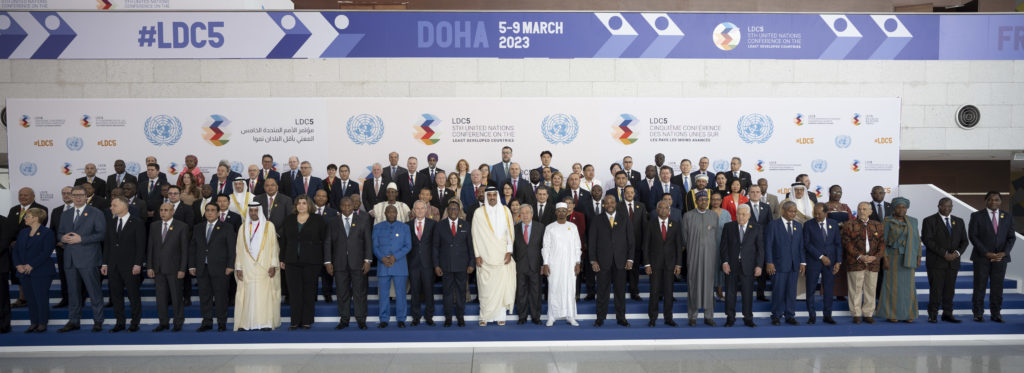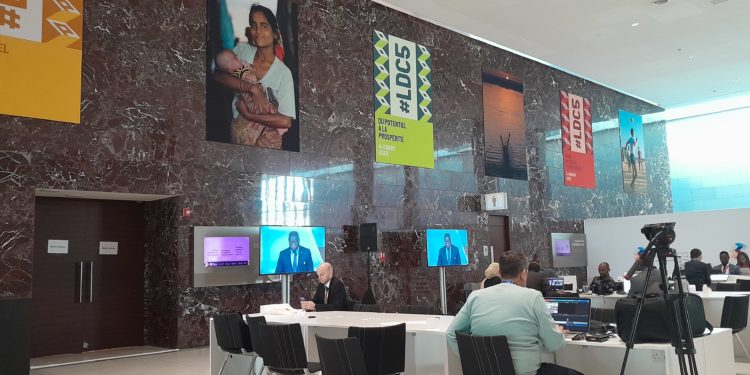By Kemo Cham in Doha
Sierra Leone’s President Julius Maada Bio has called on wealthy nations to write off the debts of poor countries as a way of cushioning the effects of the prevailing global economic crisis.
Bio told delegates at the ongoing 5th UN Conference on the Least Developed Countries (LDCs) in Qatar on Sunday that debt relief, alongside investments in connectivity and infrastructure that support economic diversification hold the key for countries to graduate from the poor nations category.
“Persistent structural global inequalities, the COVID-19 pandemic, recent geopolitical tensions, global economic head winds and disruptions have reversed the gains most LDCs have made towards achieving the SDGs. Consequently, most LDCs have failed to graduate to middle-income status,” Bio said, as part of his statement in the opening plenary on Sunday, March 5.
The five-day event, held on the theme: “From potential to prosperity,” is taking place in the Qatari capital, Doha, where over 40 world leaders, mainly from the LDCs, are gathered to discuss progress in development in the world’s poorest nations.
LDCs are defined as low-income countries confronting severe structural impediments to sustainable development. They are highly vulnerable to economic and environmental shocks and have low levels of human assets. Sierra Leone is one of 46 countries on the list that is maintained by the United Nations Office of High Representative for Least Developed Countries, which is reviewed every three years.
Countries that fall under this category enjoy exclusive access to certain international support measures, particular in the areas of development assistance and trade.
According to UN data, 12% of the world’s population are currently in the LDCs and they constitute over 40% of the world’s poor people, grappling with issues like food scarcity, poor health care systems, among others, which expose them to widespread vulnerabilities.
The conference agenda is based on the Doha Programme of Action Plan, which is a development blueprint that outlines actions to be taking by LDCs and their development partners both locally and internationally.
President Bio in his address recommitted his government to the implementation of the Plan with the goal of attaining the UN Sustainable Development Goals. He called for a scale up of international and national efforts to urgently address the plight of LDCs.
Like Sierra Leone, many LDCs are conflict affected, either in conflict or are emerging from it. This further complicates the challenges these countries face.
“The collective cause of the g7+ — that Sierra Leone currently chairs – is aligned with the Doha Plan of Action which recognises the nexus of peace and development. 18 of the 20 g7+ countries are on the LDC list. This group of countries continues to be adversely and disproportionately affected by the current global crises,” said Bio.
“We, therefore, renew calls for debt relief and investments in connectivity and infrastructure that support economic diversification. Additionally, regional and global actors must support ecosystems of shared peace while adhering to such aid effectiveness principles as respect for country ownership and leadership,” he stressed.

The UN says that 25 developing economies are spending over 20 per cent of government revenues solely on servicing debt.
The LDC conference is held once in a decade and the results of the previous 10-year Action Plan for the countries are discussed and adopted. The last conference was held in Istanbul, Turkiye, in May 2011, and last year, the Doha Plan of Action was adopted.
UN Secretary-General, António Guterres said in his statement earlier in the official opening ceremony that the world must find ways to work together in the face of deepening global tensions that further worsen the plight of LDCs.
“And there is perhaps no more important issue around which we can and must unite than in transforming the words of the Doha Programme of Action into results,” Guterres said.
“We don’t have a moment to lose,” he stressed.
The Amir of Qatar, Sheikh Tamim bin Hamad Al Thani, officially opened the conference with a call for concerted efforts by the global community to help the LDCs overcome the prevailing global challenges of conflicts, food insecurity, climate change and the Covid-19.
“It is incumbent on us to contemplate these challenges as we plan for a shared future for our peoples and countries over the next decade of the existence of the least developed countries,” he stated.
President Bio is one of 26 heads of states and government that are attending the Doha confab. They are mainly from Africa, including the leaders of Guinea Bissau, Chad, Zambia and Malawi.
Also present are the leaders of Ghana and Nigeria, which are not LDCs.






















